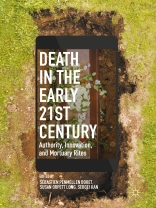Focusing on tradition, technology, and authority, this volume challenges classical understandings that mortuary rites are inherently conservative. The contributors examine innovative and enduring ideas and practices of death, which reflect and constitute changing patterns of social relationships, memorialisation, and the afterlife. This cross-cultural study examines the lived experiences of men and women from societies across the globe with diverse religious heritages and secular value systems. The book demonstrates that mortuary practices are not fixed forms, but rather dynamic processes negotiated by the dying, the bereaved, funeral experts, and public institutions. In addition to offering a new theoretical perspective on the anthropology of death, this work provides a rich resource for readers interested in human responses to mortality: the one certainty of human existence.
İçerik tablosu
1. Introduction.- 2. Fear and Prayers: Negotiating with the Dead in Apiao, Chiloé (Chile).- 3. Quelling the “Unquiet Dead”: Popular Devotions in the Borderlands of the USSR.- 4. Life After Death/Life Before Death and Their Linkages: The United States, Japan, China.- 5. Reincarnation, Christianity and Controversial Coffins in Northwestern Benin.- 6. For the Solace of the Young and the Authority of the Old: Death Photography in Acholi, Northern Uganda.- 7. Mediating Mortality: Transtemporal Illness Blogs and Digital Care Work.- 8. Agency and the Personalization of the Grave in Japan.- 9. Remembering the Dead: Agency, Authority, and Mortuary Practices in Interreligious Families in the United States.
Yazar hakkında
Sébastien Penmellen Boret is an anthropologist at the International Research Institute of Disaster Sciences of Tohoku University, Japan.
Susan Orpett Long is Professor of Anthropology at John Carroll University, USA.
Sergei Kan is Professor of Anthropology and Native American Studies at Dartmouth College, USA.












